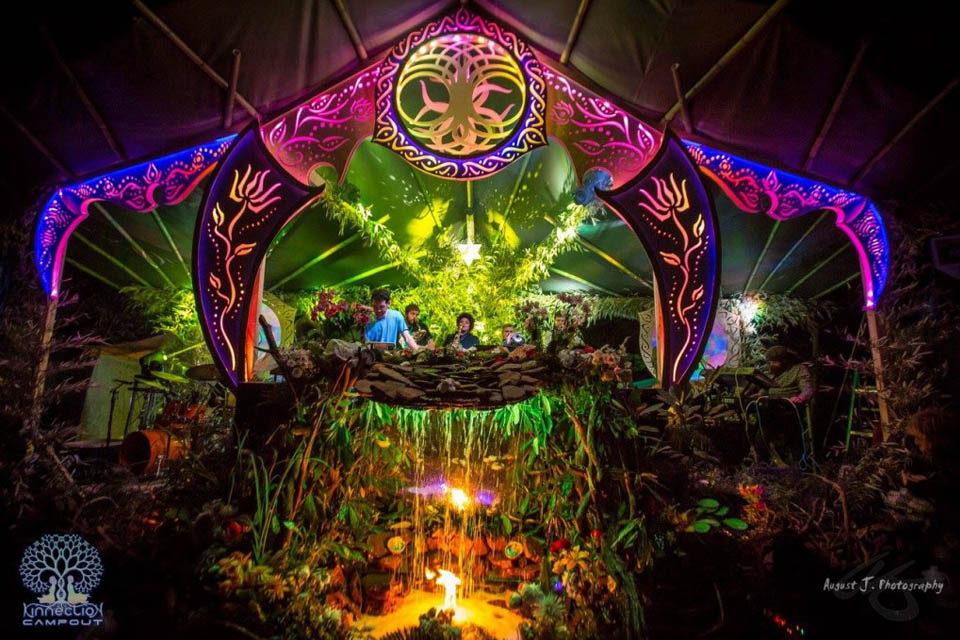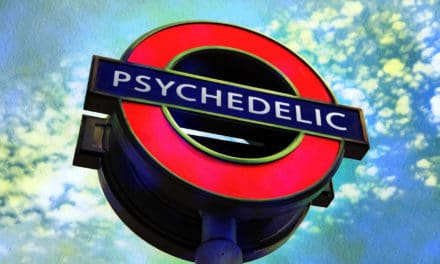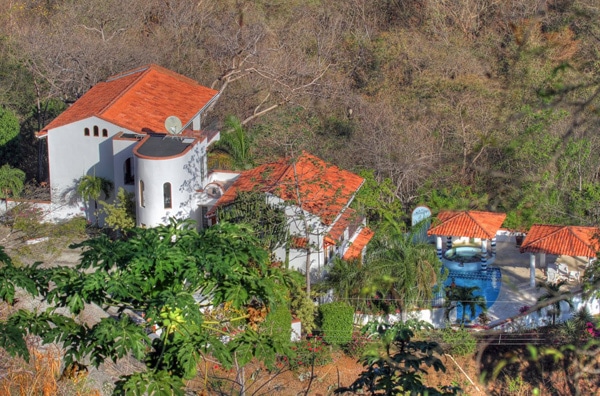
Author and speaker James Oroc is one of the leading voices in the psychedelic world on 5-MeO-DMT, having penned the classic book on the subject, Tryptamine Palace. Originally written to give away as a gift to people on the playa at Burning Man, Oroc would eventually find himself a fixture at transformational festivals around the world, speaking on “The God Molecule” and his theories about psychedelic culture and the quantum nature of reality. Oroc’s latest book, The New Psychedelic Revolution: The Genesis of the Visionary Age, distills his experience of being embedded within this emerging psychedelic and transformational culture, putting the visionary artists, electronic musicians, and rogue chemists behind this movement into broader historical context while also sharing some eye-opening personal accounts.
I happened to first meet James Oroc at the transformational festival Alchemeyez Visionary Arts Congress in 2011, and it was a pleasure to reconnect with him and discuss his new book. In this first interview, we explore the magic and pitfalls of the transformational festival movement embodied at events like Burning Man and Boom!, and why psychedelic art, music, and group ecstasis is important.
Thanks so much for speaking with us, James. One of the things that jumped out to me in The New Psychedelic Revolution was how you highlighted the importance of psychedelic-inspired art, music and gatherings in this new psychedelic revolution. Many psychedelic advocates of the more scholarly ilk might downplay the visionary art, music and festivals that have been part of this scene, and instead just make it all about the science. So I’m curious, why do you think that visionary art, music and culture is so important in the big picture?
Because I think that ultimately that’s how you infect the culture. Science is one way to make change, but another way is to change the way things are done culturally. My book points out what has happened over the last 15 years and how I witnessed the whole thing take off. I had just come back from Lightning in a Bottle- it was its biggest incarnation yet, and an interesting mix of the new and the old. I think it’s just the way that psychedelic culture is reaching out into the mainstream, the same way it did in the 60’s but in a little bit more thoughtful manner.
Speaking of the 60’s, one of my favorite lines from the book was when you said of that era “Few social revolutions have succeeded so quickly and then been abandoned in such haste.”
[Laughs] I like that one too.
It’s profound because it’s true! You mentioned a couple of key differences between the 60’s and today in the book, but what do you see as the essence of how these cultural inroads might be longer lasting than before?
I think part of what we’ve got going on is a reaction to the very ego-driven end of the 20th century, especially the 80’s. And I think a lot of what’s happened is due to the reach of the internet and the fact that we are so connected for the first time in history. Psychedelic information and psychedelic culture have been able to spread unhindered, maybe for the first time.
Culturally, you’ve seen that result in things like Burning Man and Boom!. In the 60’s there used to be this idea of creating this commune where people could gather together and live and grow veggies and all that stuff, and I think now we’re more of this gypsy global tribe where we have these nodes that we come together at and then we go apart again. I hadn’t been to Lightning in a Bottle in years, and there were so many people there- you go from one hug to the next. The more time you spend within the family, the more people you meet, and the more you feel at home. That sense of belonging I think is one of the things that transformational festival culture has been able to provide. It’s more and more rare in today’s society.
Agreed completely. You have these parallel visions where people come together in these nodes, either in a temporary way at festivals or in a more permanent way in a commune or ecovillage. And then you have the pollinators, the global gypsy tribe you mention who bounce from one node to the other sharing information and experiences. Someone learns how to build sustainable farm technology in South America, and then brings it back to someone’s homestead project or shares it in a workshop at a festival. It extends from practical info sharing to just collective ecstatic sharing on the dancefloor, with art and experience.
As someone who’s been on the front lines of this transformational festival movement for many years, what’s your raw take on the transformational festival movement of today? Do you see it as collapsing? Thriving? Evolving? Selling out? Some mix of all of those?
I think it’s always evolving, and the same can be said with the transformational festival community at large. If you’ve been going to them for a long time, it’s easy to be nostalgic for the close-knit nature of the first few years. But what you see now is that it’s really penetrating and there are a lot of people coming to these festivals who wouldn’t have before, so I think they’re spreading out very successfully. You can be cynical of that, or be positive about it, or both. I think it’s definitely infiltrating popular culture and becoming something of a youth fashion. Whether that’s a good thing or a bad thing, we’ll find out.
I myself have mixed feelings on the subject. It’s easy to become jaded, not just in lamenting for days gone by when things were more close knit, but when you go to a festival and see a bunch of kids with Alex Grey print shirts zonked out on whippets, mushrooms and whiskey, or smoking DMT all weekend long. They’re kind of bringing the vibe down rather than lifting it up. Or, you see the kind of ‘bros’ who come in wanting basically an Ibiza weekend. How do you keep yourself from becoming too jaded?
I have the same mixed feelings about the Silicon Valley community at Burning Man. I’m glad they’re there because I think the Burning Man ethos is infiltrating them, but in other ways I wish they weren’t there because they’ve changed the character of the event so much with the influx of their wealth. I think at the end of the day, you just have to hope that the meme is taking hold. There are certain histories like that. I have friends who are CEO’s and have gotten home from Burning Man and got a call from someone who wants to do business with them, and it turns out they just got back from Burning Man too. You do see people coming back from the burn wanting to make their businesses and corporations more humane, more environmental, and I think it’s creating a positive result in many ways. But there’s a danger of becoming a fashion and thinking that merely going to the festival is going to change things.
It’s certainly better than a big mainstream rock festival where noone is doing any thinking, you know? We’ve seen this evolve. Lollapalooza was one of the first festivals that started to bring in this idea that you go to a festival and still learn something and have some other experiences. I think that’s part of 21st century living: we want multiple experiences. For me, I love the synchronicity at these festivals, and I love all the little offshoot corners. I don’t spend a lot of time at the big main stages, but I love all the little dives and spaces and places that people create, and prefer to weave all through that- my own personal board game. Whether you’re at Symbiosis, or Lighting in a Bottle or Boom! or Burning Man, you just set off on this little mini-adventure, which can be quite mythical at times, within the structures of the festival itself. In that sense, they help people evolve out of their norms and expected behavior.
Living in New Orleans, I’m pretty used to that. We have Mardi Gras, and Mardi Gras for locals is an opportunity to become this other creature for a day- you become your costume and whatever wild thing you want to create. You really take on the personality of that costume for the day, it’s quite a remarkable thing, and I think these festivals have that same transformative power. It’s very much the prankster model too, that you can create your own prankersterous reality. So they definitely have a function, and it seems like they are very much a result of the era in which we’re living.
Beautifully put. One thing that really struck me recently was learning about the default mode network (DMN) in the human brain, and comparing that to the burner concept of the “default world.” These transformational festivals are a step outside of the default world, and also offer a step outside of the default mode network due to their novelty and immediacy, just like psychedelics do.
I definitely think they’re like the modern equivalent of the Dead tour in the 70’s. I’m not a deadhead, but what I appreciate is the community that they created. The funny thing after being so long in this thing now, is that when I go to a festival I feel more at home than I do in the so called “real world,” you know? I’ve been going to Burning Man for almost 20 years now, so when I’m out there I feel ridiculously normal.
I was wandering around one Friday night with three friends from New York who were at their first burn. My bike was broken down, and I was pushing it through the desert out in the middle of nowhere. I’m looking around and I go “Oh, it’s kind of quiet out here tonight” and they all start laughing, because to them it’s the craziest thing they’ve ever seen.
It always amuses me how comfortable and natural I feel in those environments. You really quickly click back into the festive world. After more than a decade, I have more friends at any of the big festivals than I do in any city or any other place in the world. There are so many people there that you want to see, and you can never see them all. The phones all overload and you’re forced into this flow of synchronicity. I think cell phones may kill Burning Man. People get mad at me that I won’t take a cell phone out on the playa. I’m like “Nope, I refuse.” You see so many people looking down at their phones at Burning Man trying to find each other; it’s hilarious.
Yeah, you gotta use the Akashic network, not the cell network, out there.
Well, that’s where the magic is, in the synchronicity, you know? I love that. There’s plenty of it.
We are very grateful to James for sharing his insights and experience with us. Stay tuned for further discussions with James Oroc in the coming weeks, and check out his fantastic new book here.










